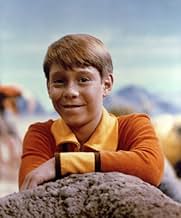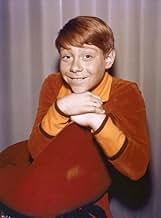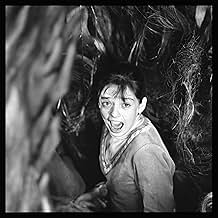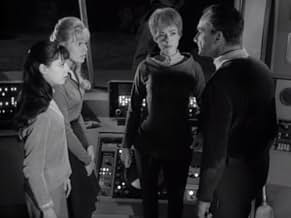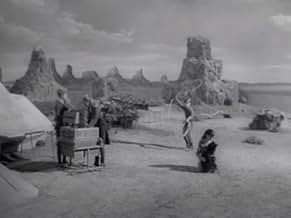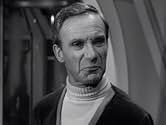जब एक जासूस और आकस्मिक बेटिकट यात्री एक अंतरिक्ष यान को पूरी तरह से गलत दिशा में भेज देता है, तब उस अंतरिक्ष यान पर रहने वाला एक परिवार जीवित रहने के लिए संघर्ष करते हैं.जब एक जासूस और आकस्मिक बेटिकट यात्री एक अंतरिक्ष यान को पूरी तरह से गलत दिशा में भेज देता है, तब उस अंतरिक्ष यान पर रहने वाला एक परिवार जीवित रहने के लिए संघर्ष करते हैं.जब एक जासूस और आकस्मिक बेटिकट यात्री एक अंतरिक्ष यान को पूरी तरह से गलत दिशा में भेज देता है, तब उस अंतरिक्ष यान पर रहने वाला एक परिवार जीवित रहने के लिए संघर्ष करते हैं.
- 2 प्राइमटाइम एमी के लिए नामांकित
- 1 जीत और कुल 5 नामांकन
एपिसोड ब्राउज़ करें
फ़ीचर्ड समीक्षाएं
I think this was the best thing that Irwin Allen ever did. Although the show drifted far away from its original synopsis,the adventures of a family in space, it eventually became the story of a boy and his robot. Bill Mumy became a hot talent in Hollywood after the series and his role as Will as the likeable son is one of TV's most endearing roles. Johnathan Harris was the villain we loved to hate as he became of another of the screen's most versatile character actors. The man showed great talent arguing with an inanimate prop and making it the hero of the show. The unnamed robot, ironically, became more dimensionally than anyone else in the show, and forget Mary Anne vs. Ginger, how many guys had crushes on Penny Robinson than on Judy ? Penny was the adorable ingenue next to the obvious Hollywood presence of Marta Kristen, the first Marilyn Monroe of the galaxy. John and June Robinson, however, slowly became less the leaders and heros of the series as they became closer to Ward and June Cleaver as they spilled out parental advice and punishments. Don West, however, remained mostly the same character without any developments in his character and past, but that can be directly blamed on the series focus between Will, the Robot and Dr. Smith while everyone else became just a little bit more than supporting roles. Despite these few faults, I still think its one of the best things to ever grace television.
I guess I'm alone in my views these days, but I've never agreed with the critics (or the vast audiences) that adore contemporary TV series like "Seinfeld" or "Friends."
For me, the best decade for TV (by a million miles) was the 1960s. It was truly a unique decade for television. Series produced then are totally unlike anything produced previously or since. I don't know what it was (perhaps someone spiked the water back then), but TV in the 1960s was unique. There was a certain sense of wonder, a certain sense of the fantastic---and a definite 60s vibe of surrealism that crept into every show from "Green Acres" to "Batman" to "Gilligan's Island."
And for my money, the best show in TV's greatest decade was "Lost in Space." It's impossible to describe what watching this show was like in the 1960s. It's an experience that simply can't be re-produced today. For a start, America was still an optimistic nation and we had an ambitious space program that would soon take us to the moon. For everyone who was young in the 60s, it seemed highly plausible that, we too, would get a chance to ride a rocket into space within our lifetimes. Little could we fathom that, after 1972, America wouldn't even land a person on the moon for 35 long years.
Today's TV shows are stiflingly dull and seem to be created by committees that cynically use focus groups to create their sterile product. "Lost in Space" is a million miles away from this creative process. In fact, it's the total opposite (and all the more brilliant for this).
The greatest science fiction always had a sense of wonder and mystery. "Lost in Space" captured the mystery of space---indeed, the show itself was actually quite bizarre. It's a far cry from the over-rated "Star Trek," which, instead of giving us a sense of mystery, followed an (increasingly stale) by-the-numbers formula.
And "formula" is precisely what one did NOT get in viewing "Lost in Space." Indeed, this show is so strange that, viewing it today, it seems like a relic from a lost civilization. It's hard, in fact, to really even fathom who the producers were targeting as their audience.
Naturally, there are cynics who hate this show, and fall over themselves pointing out the plot holes and the ignorance of "realism." To those folks, I say: Chill out. Even TV's "realistic" shows are NOT as realistic as they hyped to be. "Star Trek," for example, has plenty of flaws in its science. Even a highly-praised show like "ER," the medical drama, has plenty of inaccuracies (as any medical professional will tell you).
In many ways, "Lost in Space" does a wonderful job of capturing the essence of what made the 60s the greatest decade of the 20th century for TV, film, music, and culture in general. It's something we'll never re-capture in today's stale culture, dominated as it is by dull, overpaid celebrities. We've gone a long ways downhill from The Beatles to "American Idol."
For me, the best decade for TV (by a million miles) was the 1960s. It was truly a unique decade for television. Series produced then are totally unlike anything produced previously or since. I don't know what it was (perhaps someone spiked the water back then), but TV in the 1960s was unique. There was a certain sense of wonder, a certain sense of the fantastic---and a definite 60s vibe of surrealism that crept into every show from "Green Acres" to "Batman" to "Gilligan's Island."
And for my money, the best show in TV's greatest decade was "Lost in Space." It's impossible to describe what watching this show was like in the 1960s. It's an experience that simply can't be re-produced today. For a start, America was still an optimistic nation and we had an ambitious space program that would soon take us to the moon. For everyone who was young in the 60s, it seemed highly plausible that, we too, would get a chance to ride a rocket into space within our lifetimes. Little could we fathom that, after 1972, America wouldn't even land a person on the moon for 35 long years.
Today's TV shows are stiflingly dull and seem to be created by committees that cynically use focus groups to create their sterile product. "Lost in Space" is a million miles away from this creative process. In fact, it's the total opposite (and all the more brilliant for this).
The greatest science fiction always had a sense of wonder and mystery. "Lost in Space" captured the mystery of space---indeed, the show itself was actually quite bizarre. It's a far cry from the over-rated "Star Trek," which, instead of giving us a sense of mystery, followed an (increasingly stale) by-the-numbers formula.
And "formula" is precisely what one did NOT get in viewing "Lost in Space." Indeed, this show is so strange that, viewing it today, it seems like a relic from a lost civilization. It's hard, in fact, to really even fathom who the producers were targeting as their audience.
Naturally, there are cynics who hate this show, and fall over themselves pointing out the plot holes and the ignorance of "realism." To those folks, I say: Chill out. Even TV's "realistic" shows are NOT as realistic as they hyped to be. "Star Trek," for example, has plenty of flaws in its science. Even a highly-praised show like "ER," the medical drama, has plenty of inaccuracies (as any medical professional will tell you).
In many ways, "Lost in Space" does a wonderful job of capturing the essence of what made the 60s the greatest decade of the 20th century for TV, film, music, and culture in general. It's something we'll never re-capture in today's stale culture, dominated as it is by dull, overpaid celebrities. We've gone a long ways downhill from The Beatles to "American Idol."
I'm glad to say that "Lost In Space" had a big influence on my childhood while growing up. Countless hours were spent "playing" Lost In Space in our basement. I barely, barely remember the first run except that the robot scared me, so I truly came in during the first syndication run. At age 42, I still enjoy all of Season One. The Magic Mirror, My Friend, Mr. Nobody, and Follow The Leader are all great examples of this show. It's unfortunate that the other two seasons went the way of Batman and became just plain silly and cartoonish. However the first season had action packed space adventure, a crash landing, jet packs, laser rifles, the chariot, scary monsters including the Cyclops and fantastic music by John Williams, (the best music ever created for TV in my opinion.) The Jupiter Two sets are still fantastic and believable today, including the fabulous creation of the Robot. The ensemble cast was excellent, and I for one wish that Smith had remained evil and menacing during the run of the show. It may not have been as intellectual as Star Trek but it was good, clean, scary fun!
I don't know if combining Forbidden Planet with Seinfeld and Gilligan's Island is exactly on target, but there are elements of all three. I was in second grade when this show premiered, and I never missed an episode. The stories were always interesting to me, and even at age eight the character of Dr. Smith absolutely captured my imagination. There are aspects of this fellow that are so very interesting - here is a guy with a great deal of education who never seems to have learned anything from the mythology he is always reciting to everyone, as in "All That Glitters", my all-time favorite episode. He didn't remember the tragedy of King Midas when he was making his wish? His greed and his cowardice override any mental advantage he may have. He is truly the George Costanza of space exploration - whenever he stumbles upon a piece of good fortune he has to milk it for all it's worth until the whole situation turns on him. Then there are the children - Will and Penny. No matter what Dr. Smith does they still like the guy, and he does a lot. He bargains with aliens to take Will's brain for their experiments instead of his, and in another episode turns Penny into platinum, although he does feel remorse about the latter deed. In fact, the children are Smith's only friends. He is merely tolerated by the adults, and for good reason.
Finally there is the "innocence and chastity beyond reason" element that was part of Gilligan's Island and is part of this show too. Despite the only natural and healthy attraction between Major Donald West and Judy Robinson, we are to believe that nothing really happens between the two for years on end. Also like Gilligan's Island, although the group's first priority starts off as finding a way to return to earth, eventually they settle into a kind of domestic tranquility and seem to make peace with their situation of being "lost in space".
Of course, rewatching this series over forty years later, it is not quite as great as I remembered it, but it is still great fun and Smith is still a fascinating character. It's also interesting to see what people in the 1960's thought earthly civilization would be like in 1997. It's humorous yet somewhat tragic to see the optimistic viewpoint people had of the future in the 1960's pertaining to human nature. What the series' creators couldn't foresee is that today people are much more like Zachary Smith than the Robinson family - at least the people in charge of things are.
Finally there is the "innocence and chastity beyond reason" element that was part of Gilligan's Island and is part of this show too. Despite the only natural and healthy attraction between Major Donald West and Judy Robinson, we are to believe that nothing really happens between the two for years on end. Also like Gilligan's Island, although the group's first priority starts off as finding a way to return to earth, eventually they settle into a kind of domestic tranquility and seem to make peace with their situation of being "lost in space".
Of course, rewatching this series over forty years later, it is not quite as great as I remembered it, but it is still great fun and Smith is still a fascinating character. It's also interesting to see what people in the 1960's thought earthly civilization would be like in 1997. It's humorous yet somewhat tragic to see the optimistic viewpoint people had of the future in the 1960's pertaining to human nature. What the series' creators couldn't foresee is that today people are much more like Zachary Smith than the Robinson family - at least the people in charge of things are.
SPACE FANTASY... STAR TREK certainly utilized elements of whimsy but not to this degree ...I think especially of an example such as the space circus episode,or the wonderful episode in which Dr. Smith turns slowly into a stalk of celery (an acting tour de force, by the way...)...Stunning use of archetypes such as the innocent young lad, the brave companion and the cowardly uncle...many have complained of the cardboard quality of the so called "main characters" of this series, but what an interesting use of them. The so called adult "stars" being only paper backdrops, intentionally made so, so as to throw into relief the richness of these archetypes and the genuinely mythic adventures in which they find themselves.The "special guest star" status of Jonathan Harris is one of the great ironic tricks of network television. A very underrated series.
क्या आपको पता है
- ट्रिवियाJune Lockhart had the biggest parking space on the 20th Century-Fox lot because she would often drive her favorite vehicle to work - a 1923 fire engine.
- गूफ़The Robot is mounted on tracks. Yet in close-ups when it moves with a normal walking action and it is possible to see the actors legs move in the lower parts of the suit.
- इसके अलावा अन्य वर्जनA pilot episode was filmed that did not include either Robot or Dr. Smith! This film was not broadcast in 1965 but was shown on TV and released to video in the 1990s.
- कनेक्शनEdited into The Man from the 25th Century (1968)
टॉप पसंद
रेटिंग देने के लिए साइन-इन करें और वैयक्तिकृत सुझावों के लिए वॉचलिस्ट करें
- How many seasons does Lost in Space have?Alexa द्वारा संचालित
- What's the deal with the Jupiter 2 having no bottom section after it lands? Is it just something they hoped no one would notice?
- What year does this series take place in?
विवरण
- रिलीज़ की तारीख़
- कंट्री ऑफ़ ओरिजिन
- भाषा
- इस रूप में भी जाना जाता है
- Space Family Robinson
- फ़िल्माने की जगहें
- उत्पादन कंपनियां
- IMDbPro पर और कंपनी क्रेडिट देखें
- चलने की अवधि1 घंटा
- रंग
इस पेज में योगदान दें
किसी बदलाव का सुझाव दें या अनुपलब्ध कॉन्टेंट जोड़ें





